|
|
|
Sort Order |
|
|
|
Items / Page
|
|
|
|
|
|
|
| Srl | Item |
| 1 |
ID:
192008
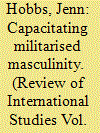

|
|
|
|
|
| Summary/Abstract |
This article examines the soldiering body in relation to the increasing prevalence of genitourinary injuries in military personnel. Feminist scholars have demonstrated that the idealised masculine soldiering body are central to the workings of international politics. The article shows that US militarised masculinity operates through the selective distribution of bodily capacities. The article draws upon critical disability studies, particularly Jasbir Puar's work on capacity and debility, to argue that treatments for genitourinary injuries revolve around the production of seminal capacity. Queer and trans bodies are debilitated in these arrangements through the denial of heterosexual and cisgender capabilities to them. To unpack this argument the article analyses treatments for genitourinary injuries. The article shows that genitourinary injuries destabilise the gender identity of US service members. Through an exploration of surgical treatments, including penis transplants and reconstructive surgeries, and fertility treatments, the article shows how masculine capacitation is achieved for some US service members through the debilitation of others; in particular, queer and trans bodies, and the bodies of Iraqi and Afghan civilians.
|
|
|
|
|
|
|
|
|
|
|
|
|
|
|
|
| 2 |
ID:
171804
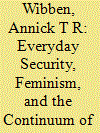

|
|
|
|
|
| Summary/Abstract |
This article returns to the original forum question “What is Global Security Studies?,” looking at it in relation to the theme of inclusion and exclusion to point out that security studies scholars exclude feminist scholarship on (everyday) security at their own peril. Showcasing the increasing body of feminist security studies scholarship, the article then highlights not only what scholarship might be included in a truly global security studies, but also the important insights (e.g., about the continuum of violence that spans peace- and wartime) that are missed without it. The article ends with a reflection on the need to also include a wider range of approaches as eminently valuable to global security studies.
|
|
|
|
|
|
|
|
|
|
|
|
|
|
|
|
| 3 |
ID:
171800
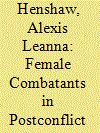

|
|
|
|
|
| Summary/Abstract |
Research on contemporary internal armed conflicts has consistently shown that women are active in most armed insurgencies, in groups with varied ideologies, and in every region of the world. However, scholarship from feminist security studies shows that, not only are women still generally underrepresented in peace processes, but women affiliated with rebel groups in particular are more likely to be excluded from disarmament, demobilization, and reintegration (DDR) efforts. Closing this gap is a necessary next step for improving the security of women. This article draws on feminist theory and feminist security studies literature to highlight four factors that contribute to the exclusion of insurgent women from DDR efforts: attributions of agency, gendered hierarchy within groups, the tendency to collapse complex intersectionalities, and the pressure for patriarchal reordering after conflict. Drawing on selected cases, I illustrate each of these factors at work and discuss the implications for female ex-combatants, policy-makers, and scholars.
|
|
|
|
|
|
|
|
|
|
|
|
|
|
|
|
| 4 |
ID:
126702
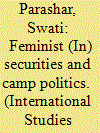

|
|
|
|
|
| Publication |
2013.
|
| Summary/Abstract |
Forum: The State of Feminist Security Studies: Continuing the Conversation. This forum comprises seven pieces conceived in response to the recent Politics & Gender Critical Perspectives section that featured contributions from Carol Cohn, Valerie Hudson, Jennifer Lobasz, Laura Sjoberg, Ann Tickner, Annick Wibben, and Lauren Wilcox (P&G 2011, Vol. 7, Issue 4). Throughout, we refer to this collection as "the CP section."
|
|
|
|
|
|
|
|
|
|
|
|
|
|
|
|
| 5 |
ID:
193145
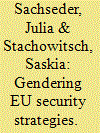

|
|
|
|
|
| Summary/Abstract |
This paper explores the relationship between the EU’s current re-imagining as a global security actor and its stance as a global promoter of progressive gender norms. For this purpose, we analyse how gender and race are constitutive of the meanings of security and Europe in major EU security strategies, and how this relates to the way gender (equality) is addressed as a policy issue. We find that, in the context of waning liberal world order and manifold internal and external crises, EU security actorness is constructed through narratives of masculinisation that entail feminisation of the EU’s own past as a “peace project” and “soft power”; Othering of non-EU spaces and subjects; colonial perspectives on the EU’s role in the world as “White Man’s burden” and the reconstruction of whiteness through notions of “neutral” masculinities associated with technocratic professionalism, superior knowledge production, and market rationality. This intersectional gendering of EU security limits the emancipatory potential of gender policy through the racialisation of Other women and the simultaneous invisibilisation of postcolonial structures of inequality. Our analysis provides the groundwork for addressing how and why the EUropean security project continues to reproduce intersectional power relations and insecurities, despite commitments to gender equality and non-discrimination.
|
|
|
|
|
|
|
|
|
|
|
|
|
|
|
|
| 6 |
ID:
184043
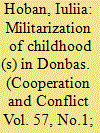

|
|
|
|
|
| Summary/Abstract |
This essay critically examines how the militarization of childhood(s) takes place in the Luhansk and Donetsk People’s Republics. The intensification of hostilities in Eastern Ukraine in mid-2014 has had a profound impact on local populations, particularly children. While no systematic recruitment and participation of children in conflict has been reported, childhood has become what Agathangelou and Killian would characterize as a ‘site for displacement and maneuvering for militarization.’ Drawing on feminist methodologies, I examine processes of the militarization of children’s everyday lives. This article investigates a range of ways in which authorities of proto-states in the Donbas region address children as participants and potential collaborators in the processes of militarization. In my analysis, I examine how war and preparation for it are simultaneously co-constituted by the geopolitical—legitimation of new proto-states—and everyday practices, such as engaging with school curricula, visiting museums, and (re)inventing historical narratives. Understanding of mechanisms that militarize childhood and how children become subjects and objects of militarization allows for a critical analysis that reveals spaces of everyday violence. This article, therefore, enhances our understanding about the intersections of childhood, militarism, and security.
|
|
|
|
|
|
|
|
|
|
|
|
|
|
|
|
| 7 |
ID:
188701
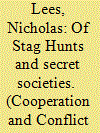

|
|
|
|
|
| Summary/Abstract |
In many circumstances where multiple, autonomous actors exist, cooperation is only a viable strategy if other actors also pursue a strategy of cooperation. Such situations can be characterised in terms of the Stag Hunt, based on a parable told by Rousseau. Although traditionally interpreted as a device for understanding how mutually beneficial cooperation can emerge, Harrison Wagner points out that would-be exploiters must overcome similar problems to succeed at subjugating others. Successful cooperation may have the ironic consequence of enabling deeper conflict within and between a multiplicity of societies. Despite its canonical status, the importance of the Stag Hunt for understanding the interaction between multiple societies may have been underestimated.
Nonetheless, rational choice theory alone cannot explain how cooperation-for-predation became established, while historical sociology’s conventional ‘materialist metanarrative’ of the origin of war and the state may have unduly neglected the role of gender relations. The phenomenon of men’s secret societies, found in many stateless societies, indicates that fraternal solidarity within coalitions of men competing to control women’s labour and bodies may provide a path to the nucleation of warlike states. If this is correct, it becomes clear that in many societies, men and women experience multiplicity in qualitatively different ways.
|
|
|
|
|
|
|
|
|
|
|
|
|
|
|
|
| 8 |
ID:
178183


|
|
|
|
|
| Summary/Abstract |
This article argues that feminist technoscience studies can enrich our understanding of biopolitics by challenging the body’s boundaries and focusing on mundane practices of security. To do so, this article looks to Mexicanas/os who cross the US–Mexico border in order to donate plasma in the United States. The article argues that Mexicanas/os are objectified in cross-border donation practices as both desirable sources of life-giving matter and dangerous sources of disease. The article begins by giving some empirical context to plasma donation, before outlining the conceptual contributions of a feminist technoscience studies approach. The article then explores how Mexican bodies are produced as sites of valuable matter which have the ability to make others live. The article shows how the ‘bioavailability’ of Mexicanas/os is produced through colonial and racist histories. Finally, the article turns to the circulation of plasma, demonstrating how persistent fears about Mexican plasma as infectious reproduce highly racializing stereotypes about Mexico and Mexican bodies. The article finishes by reflecting on the importance of a feminist technoscience studies approach for stressing the co-constitutive relationship between race and matter, and that racialized productions of the body at security sites stretch well beyond the body’s skin.
|
|
|
|
|
|
|
|
|
|
|
|
|
|
|
|
| 9 |
ID:
126705
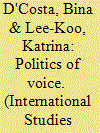

|
|
|
|
|
| Publication |
2013.
|
| Summary/Abstract |
Forum: The State of Feminist Security Studies: Continuing the Conversation. This forum comprises seven pieces conceived in response to the recent Politics & Gender Critical Perspectives section that featured contributions from Carol Cohn, Valerie Hudson, Jennifer Lobasz, Laura Sjoberg, Ann Tickner, Annick Wibben, and Lauren Wilcox (P&G 2011, Vol. 7, Issue 4). Throughout, we refer to this collection as "the CP section."
|
|
|
|
|
|
|
|
|
|
|
|
|
|
|
|
| 10 |
ID:
114595


|
|
|
|
|
| Publication |
2012.
|
| Summary/Abstract |
The critical security studies literature has been marked by a shared commitment towards the politicization of security - that is, the analysis of its assumptions, implications and the practices through which it is (re)produced. In recent years, however, politicization has been accompanied by a tendency to conceive security as connected with a logic of exclusion, totalization and even violence. This has resulted in an imbalanced politicization that weakens critique. Seeking to tackle this situation, the present article engages with contributions that have advanced emancipatory versions of security. Starting with, but going beyond, the so-called Aberystwyth School of security studies, the argument reconsiders the meaning of security as emancipation by making the case for a systematic engagement with the notions of reality and power. This revised version of security as emancipation strengthens critique by addressing political dimensions that have been underplayed in the critical security literature.
|
|
|
|
|
|
|
|
|
|
|
|
|
|
|
|
| 11 |
ID:
126699


|
|
|
|
|
| Publication |
2013.
|
| Summary/Abstract |
This forum comprises seven pieces conceived in response to the recent Politics & Gender Critical Perspectives section, titled "The State of Feminist Security Studies: A Conversation" (P&G , Vol. 7, Issue 4). Throughout, we refer to this collection as "the CP section." We are pleased to take this opportunity to continue the conversation begun in the CP section and to offer sympathetic yet critically engaged contributions in response to the original collection of essays. We hope that this forum indicates the (geographical, cultural, theoretical) diversity of feminist security studies and its multivocality, as well as providing an overview, for those not familiar with the literature, of the issues and debates currently enlivening the field.
|
|
|
|
|
|
|
|
|
|
|
|
|
|
|
|
| 12 |
ID:
177854


|
|
|
|
|
| Summary/Abstract |
Over the past two decades, the international Women, Peace and Security (WPS) agenda has established a commitment to increase the participation of women in matters of peace and security, to ensure the protection of women's rights, and to include gender perspectives in conflict prevention. The WPS agenda foresees a number of measures to make peacekeeping more gender-responsive, including training uniformed peacekeepers on gender. These policy commitments date back to the year 2000, and have instigated the development of training materials and the institutionalization of training at regional and national levels. This article examines these training mandates, asking: What is the scope and nature of gender training for peacekeepers? How is gender understood to operate in peacekeeping? A review of international and national policy commitments demonstrates that training uniformed peacekeepers on gender has become a significant transnational practice. An examination of these mandates and training guidance reveals that training discourse establishes a normative understanding of gender that is focused primarily on vulnerability to sexual violence, and that frames gender as a question of skills and capacities rather than political investments or moral values. However, differences in localization demonstrate that gender training could be and sometimes is understood more expansively.
|
|
|
|
|
|
|
|
|
|
|
|
|
|
|
|
| 13 |
ID:
193141
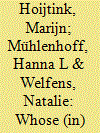

|
|
|
|
|
| Summary/Abstract |
Building on feminist and postcolonial theoretical approaches across International Relations (IR) and security studies, this Special Issue advances an emerging research agenda within EU studies by shedding light on the gendered and racialised logics of EU security and their links to colonial histories and practices. Together, the contributions to this Special Issue demonstrate how EU security is intrinsically connected to and constituted by histories of colonialism, racism and patriarchy. At the same time, they also highlight how the colonial, racialised and gendered dynamics that underpin EU security and that are mobilised by the EU, its institutions and member states are always complex and shifting. Importantly, they do so by decentring our analysis of EU security moving our focus often away from the EU and towards different, somewhat unexpected sites and geographical locations of EU security. The current war in Ukraine underwrites the need for more historical, contextual and decentred work on EU security, while also highlighting the necessity to reflect on dominant practices of knowledge production and the experiences of people living in and with war through a feminist and postcolonial lens.
|
|
|
|
|
|
|
|
|
|
|
|
|
|
|
|
| 14 |
ID:
157927
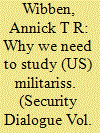

|
|
|
|
|
| Summary/Abstract |
Responding to the special issue call to examine security and militarism alongside one another, this article adopts a critical feminist lens to explore what is at stake when critical scholars study security rather than militarism – and why, for critical feminists in particular, studying one without attention to the other is not helpful. Anchoring the discussion of (US) militarism in ongoing debates about women in combat, the article proposes that studying security without attention to militarism leads scholars to miss the deeply militarist orientation of security studies. It further suggests that feminist scholarship, because it treats militarism and militarization as an integral part of feminist security studies and considers the everyday a crucial site for inquiry, is well suited to studying militarism and security alongside one another. The article then lays out what a critical feminist approach to studying militarism entails and presents some feminist insights on militarization, focusing in particular on what attention to gender can reveal about shared norms of manliness and war. Overall, the article shows why feminist perspectives offer such strikingly different insights into the relationship between militarism and security and what we miss when feminist scholarship is ignored or marginalized in scholarship on these issues.
|
|
|
|
|
|
|
|
|
|
|
|
|
|
|
|
|
|
|
|
|